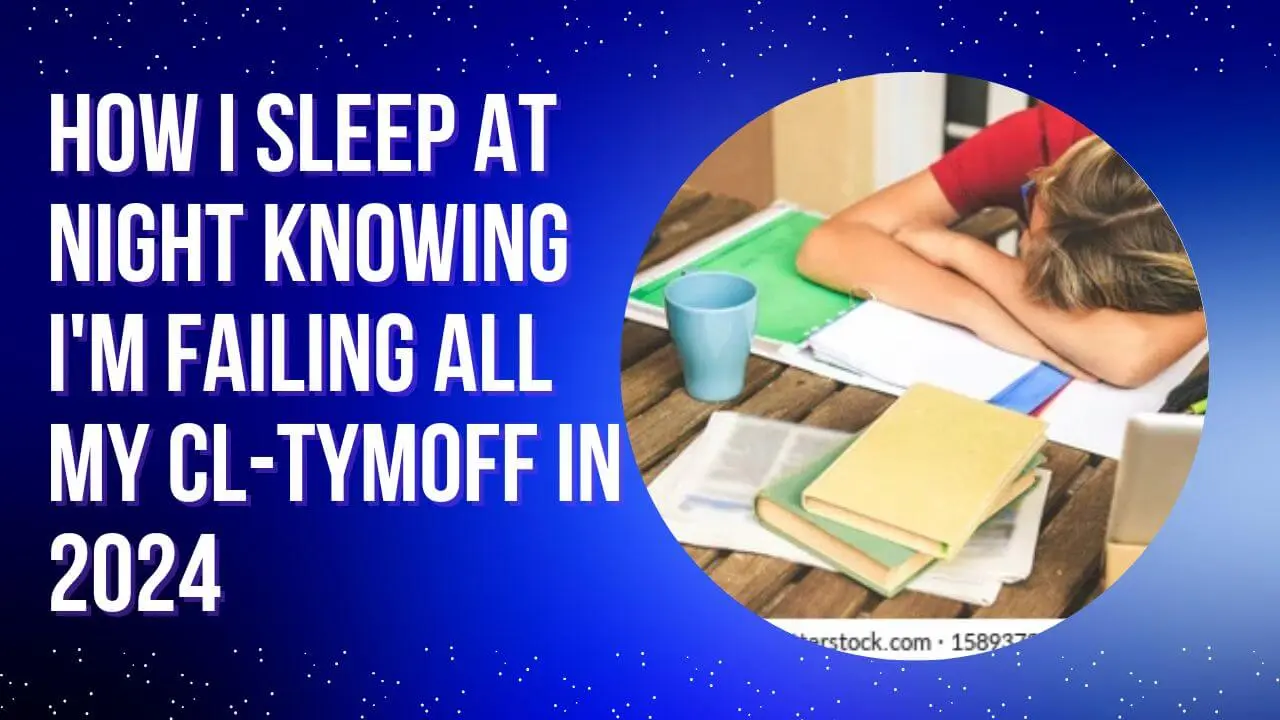How i sleep at night knowing i’m failing all my cl-tymoff In 2024

In his candid and heartfelt video, “How I Sleep at Night Knowing I’m Failing All My Classes,” content creator Tymoff shared his personal experience of juggling the demands of school and online content creation. His honesty about struggling with academic failure while pursuing his passion resonates with many students and young adults who often feel overwhelmed by the pressures of balancing multiple aspects of their lives.
In this blog, we will dive deeper into the psychological impacts of academic failure, the coping strategies Tymoff suggests in his video, and practical ways to cope with these challenges effectively.
The Psychological Impact of Academic Failure
Failing classes can have a profound impact on mental and emotional well-being. For students, the experience of academic failure often brings with it a wave of negative emotions, including feelings of shame, anxiety, and hopelessness. The fear of disappointing oneself, parents, and others can lead to a deep sense of guilt and self-doubt. Academic performance is often tied to a student’s identity and sense of worth, which is why failure can feel like a personal setback, impacting self-esteem and motivation.
When a student struggles academically, it can lead to a cascade of psychological issues:
- Anxiety and Stress: The pressure to succeed academically can create a constant state of worry, where students are unable to relax or focus. When academic failure occurs, anxiety can worsen, as the student feels the burden of catching up or repairing their grades. This fear of further failure can create a vicious cycle of stress and low productivity.
- Depression: The emotional toll of academic struggles can lead to feelings of hopelessness, inadequacy, and sadness. A student who consistently fails might begin to question their abilities and worth, leading to depression. In many cases, this emotional distress prevents them from seeking help, which only deepens the negative feelings.
EXPLORE MORE
- Memory and Cognitive Issues: Chronic stress and anxiety can negatively impact memory and cognitive function. When the mind is constantly preoccupied with worries, the ability to concentrate and retain information diminishes. This makes studying and academic performance even more difficult, as students may feel like they are stuck in a cycle of failure.
- Social Isolation: Many students who struggle academically may retreat from their social circles out of shame or embarrassment. The fear of being judged for their academic performance can lead to withdrawal from friendships and activities, resulting in loneliness and a lack of emotional support. This isolation can worsen mental health problems and make the student feel even more disconnected.
How I Sleep at Night Knowing I’m Failing All My Classes– Tymoff
In his video, Tymoff openly discusses his experience of academic failure and the emotional weight it brings. He does not shy away from acknowledging how tough it has been to balance school and content creation, but he also emphasizes that there are strategies to help manage the stress and anxiety that come with failure. Here, we will explore the coping strategies he mentions, along with additional techniques that can help anyone in a similar situation.
1. Acceptance and Self-Compassion
The first and perhaps most crucial step in dealing with academic failure is accepting that it is a part of life. Everyone encounters setbacks, and failure is not an indication of your worth as a person. Tymoff highlights the importance of self-compassion in his video, urging viewers to be kind to themselves when things don’t go according to plan. Rather than berating yourself for poor grades, acknowledge that you are human and that mistakes and failures are opportunities for growth.

Practicing self-compassion involves recognizing that you are not alone in your struggles. Everyone faces challenges, and it is okay to not always succeed. When you stop being overly critical of yourself, it becomes easier to move forward and take the necessary steps to improve.
2. Seek Support
Tymoff also encourages viewers to reach out for help when struggling academically. This can mean talking to friends, family members, or even a counselor. By sharing your feelings, you can gain new perspectives and alleviate the burden of facing difficulties alone. Support from others can provide emotional comfort and help you realize that you are not defined by your grades. Whether it’s a loved one offering a listening ear or a therapist guiding you through coping strategies, seeking support can reduce the emotional load of academic failure.
In addition to emotional support, seeking academic help is equally important. If you’re struggling with course material, consider reaching out to your professors or tutors for assistance. Often, schools offer resources such as study groups or tutoring services, which can provide additional support in mastering challenging subjects.
EXPLORE MORE
3. Develop a Structured Study Routine
One of the most effective ways to combat feelings of being overwhelmed is to create a study routine. Having a set schedule for studying and completing assignments can help you manage your time better and reduce the stress of procrastination. Tymoff points out that a structured approach allows students to break down large tasks into smaller, more manageable steps. Setting realistic goals for each study session and sticking to a routine can help reduce anxiety by giving you a sense of control over your academic workload.
Creating a study routine also involves prioritizing tasks based on their deadlines and importance. By focusing on one task at a time and avoiding multitasking, you can improve your productivity and reduce the overwhelming feeling of having too much to do at once.
4. Practice Mindfulness and Relaxation Techniques
Tymoff touches on the idea of mindfulness and relaxation as a way to manage academic stress. Mindfulness involves being present in the moment and focusing on your thoughts and feelings without judgment. Techniques like meditation, deep breathing exercises, and progressive muscle relaxation can help reduce stress, improve focus, and enhance sleep quality.
When you are feeling overwhelmed by academic failure, practicing mindfulness can help you calm your mind and break free from negative thought patterns. Mindfulness encourages you to focus on the present moment rather than worrying about past failures or future challenges. It can also help reduce the physical symptoms of stress, such as tension in the body or racing thoughts.
5. Engage in Physical Activity
Physical activity plays a vital role in managing stress and improving mental health. Tymoff discusses how regular exercise can boost mood and cognitive function, which are both essential when dealing with academic struggles. Exercise releases endorphins, the body’s natural “feel-good” chemicals, which help reduce feelings of anxiety and depression.
Even a short walk or some light stretching can help clear your mind, break up the monotony of studying, and provide much-needed mental and emotional relief. Exercise also improves sleep, which is crucial for reducing academic stress and improving overall well-being. When you feel physically better, it becomes easier to face academic challenges with a positive attitude.
Moving Forward: How to Break the Cycle of Failure
When facing academic failure, it’s essential to remember that it is not the end of the road. As Tymoff discusses in his video, setbacks are a part of the learning process, and overcoming them requires resilience. By accepting failure, seeking support, developing healthy routines, and practicing mindfulness, you can begin to break the cycle of failure and move toward success.
EXPLORE MORE
Additionally, shifting your mindset from one of perfectionism to one of growth can have a transformative impact. Understanding that mistakes are part of the journey allows you to focus on progress rather than perfection. A growth mindset empowers you to see failure as a learning opportunity, not a reflection of your worth.
Frequently Asked Questions
How can I overcome negative self-talk and self-doubt after bad grades?
Acknowledge your feelings of disappointment but avoid letting them define you. Practice self-compassion by recognizing that everyone experiences failure. Focus on what you can learn from the experience, and remember that setbacks are opportunities for growth. Keep track of your progress, and celebrate small victories along the way.

How do I manage stress with effective time management practices?
Organize your tasks by creating a schedule and breaking large assignments into smaller, manageable steps. Prioritize important tasks, and avoid procrastination by setting deadlines for yourself. Time management helps reduce the feeling of being overwhelmed and ensures that you stay on track with your academic goals.
Why is mindfulness important for academic stress?
Mindfulness practices, such as meditation and deep breathing, help reduce stress and increase clarity of thought. These techniques help calm your mind, improve focus, and enhance emotional regulation, all of which are essential for coping with academic pressure.
Why is sleep so important in managing academic stress?
Getting enough sleep is crucial for maintaining cognitive function and emotional well-being. A consistent sleep schedule helps regulate your body’s internal clock and improves your ability to concentrate and retain information. Prioritize good sleep hygiene to enhance both your mental and physical health.
How does minimizing screen time improve sleep?
Excessive screen time, especially before bed, can interfere with your body’s natural sleep rhythms. The blue light emitted by screens suppresses melatonin production, making it harder to fall asleep. Limiting screen time in the hour before bedtime can improve the quality of your sleep and help you feel more rested.
Conclusion
Conclusion
Tymoff’s video, “How I Sleep at Night Knowing I’m Failing All My Classes,” offers a raw and insightful look at the struggles many students face when dealing with academic challenges. While it is easy to feel overwhelmed by failure, it is important to recognize that setbacks are a natural part of life. By implementing healthy coping strategies like self-compassion, seeking support, managing time effectively, and practicing mindfulness, students can improve their mental health, academic performance, and overall well-being. Ultimately, failure is not the end, but rather a step in the ongoing process of growth and learning.
